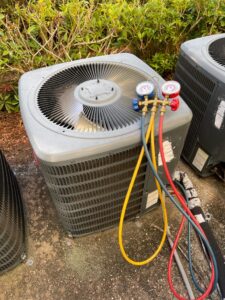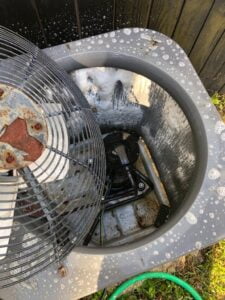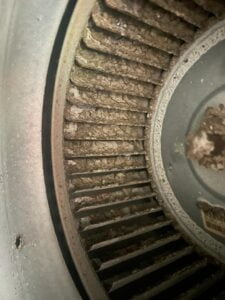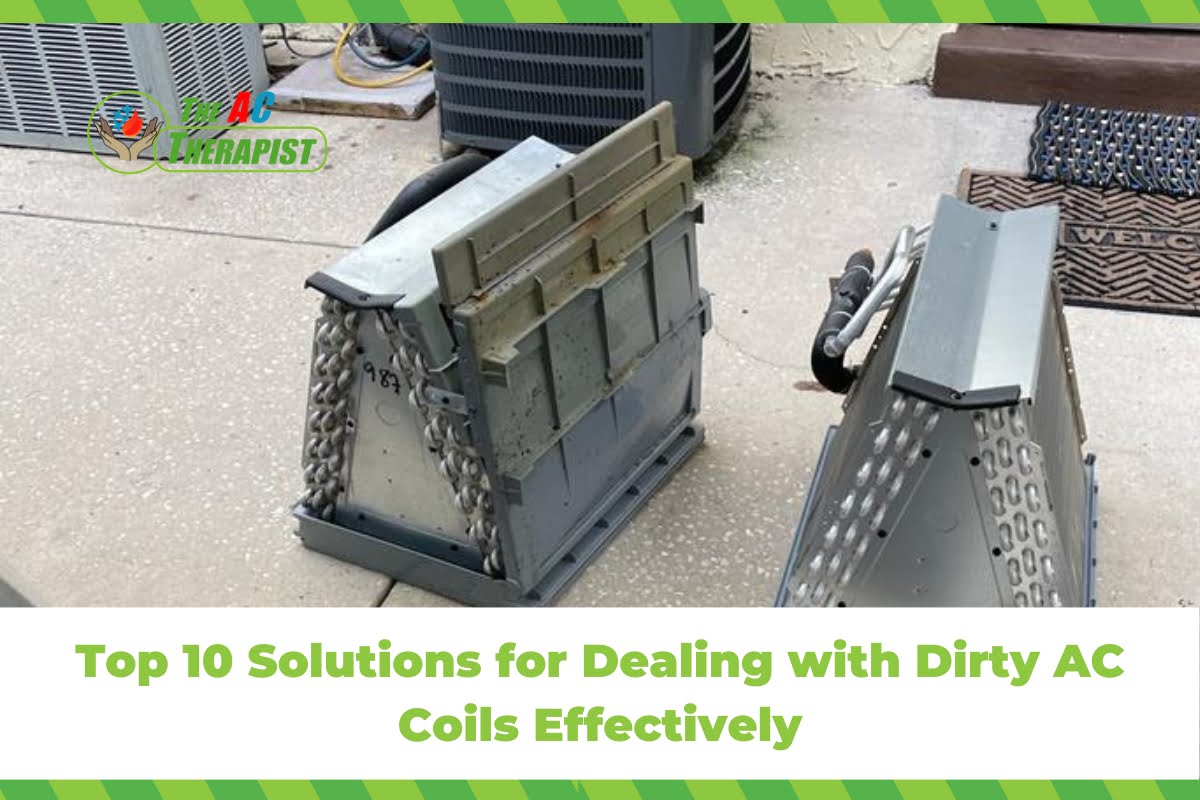Top 10 Solutions for Dealing with Dirty AC Coils Effectively
Dirty AC coils can significantly hinder the efficiency of your cooling system, leading to higher energy bills and reduced comfort. This comprehensive guide presents the top 10 solutions to effectively tackle dirty AC coils, ensuring optimal performance and improved indoor air quality.
1. Regular Maintenance Matters: Routine maintenance, including coil cleaning, prevents dirt buildup, enhances airflow, and maintains peak cooling efficiency.
2. Gentle Cleaning Techniques: Learn safe and effective methods to clean AC coils without causing damage, using appropriate tools and cleaning agents.
3. Air Filters’ Role: Explore how clean air filters contribute to keeping AC coils dirt-free, promoting healthier air circulation.
4. Professional Tune-Ups: Discover the benefits of scheduling professional AC maintenance, allowing experts to address dirty coils and other potential issues.
5. Coil Protection Strategies: Implement coil guards or covers to shield AC coils from debris, leaves, and other outdoor elements that can lead to dirt accumulation.
6. Improved Ventilation: Optimize the surrounding area of your AC unit to ensure proper airflow, reducing the likelihood of dirt buildup on coils.
7. Ductwork Inspection: Dirty ducts can introduce contaminants to AC coils. Learn how duct cleaning and sealing prevent coil-related issues.
8. Investing in Quality Filters: Select high-quality air filters that effectively capture dust and particles, minimizing the transfer of dirt to AC coils.
9. Monitoring Humidity Levels: Maintaining balanced indoor humidity prevents excessive moisture, which can attract dirt and impede coil efficiency.
10. Professional Assistance for Severe Cases: In cases of heavily soiled coils, rely on HVAC professionals to perform in-depth cleaning or recommend appropriate solutions.
Dirty AC coils are a common issue that can impact your cooling system’s effectiveness and energy efficiency. By following these top 10 solutions, you’ll be equipped to combat dirt accumulation effectively, ensuring your AC unit operates optimally and delivers cool, clean air to your space. Regular maintenance, proper cleaning techniques, and professional assistance are key to keeping your AC coils in top condition for years to come.

What happens if you don’t clean AC coils?
If you don’t clean your AC coils regularly, several negative consequences can arise:
- Reduced Cooling Efficiency: Dirty AC coils restrict airflow and heat exchange, causing your cooling system to work harder and longer to achieve the desired temperature. This results in reduced cooling efficiency and increased energy consumption.
- Higher Energy Bills: As your AC system struggles to cool effectively due to dirty coils, it requires more energy to maintain the desired temperature. This leads to higher energy bills and unnecessary expenses.
- Premature Wear and Tear: The added strain on your AC system caused by dirty coils can lead to increased wear and tear on various components, including the compressor and fans. This can result in the need for more frequent repairs and a shorter overall lifespan for your HVAC system.
- Poor Indoor Air Quality: Dirty coils can become breeding grounds for mold, bacteria, and allergens. As air passes over the dirty coils, these contaminants can be circulated into your living spaces, causing poor indoor air quality and potential health issues.
- Freezing Coils: If dirt buildup becomes excessive, it can insulate the coils, leading to condensation freezing on the coils. This can cause a blockage of airflow and potentially damage the coils or other components.
- Uneven Cooling: Dirty coils may result in uneven cooling throughout your home. Some areas may be colder than others due to restricted airflow and reduced heat exchange.
- AC Breakdowns: Over time, the strain placed on the system by dirty coils can lead to more frequent breakdowns and malfunctions, leaving you without cooling during hot weather.
- Voided Warranty: Neglecting maintenance, including coil cleaning, might void the warranty on your HVAC system. Manufacturers often require regular maintenance to honor warranty claims.
- Higher Repair Costs: Ignoring dirty coils can lead to more severe damage and complex issues, increasing the cost of repairs when they eventually become necessary.
- Shortened System Lifespan: Continuous operation with dirty coils can significantly shorten the lifespan of your air conditioning system, necessitating premature replacement and additional expenses.
In summary, neglecting to clean your AC coils can result in decreased cooling efficiency, higher energy bills, poor indoor air quality, system malfunctions, and a shortened HVAC system lifespan. Regular maintenance, including coil cleaning, is essential to ensure your AC system operates efficiently and effectively.
Does cleaning AC coils make a difference?
Yes, cleaning AC coils can make a significant difference in the performance and efficiency of your air conditioning system. Here’s how:
- Improved Cooling Efficiency: Clean coils allow for better heat exchange between the refrigerant and the surrounding air. This means that your AC system can cool your space more efficiently, reaching the desired temperature faster and using less energy in the process.
- Lower Energy Bills: When your AC coils are clean and able to transfer heat effectively, your cooling system doesn’t have to work as hard to maintain the desired temperature. This results in reduced energy consumption and lower monthly energy bills.
- Extended System Lifespan: Regular coil cleaning helps prevent wear and tear on your HVAC system. When coils are clean, the system operates with less strain, reducing the risk of breakdowns and prolonging the overall lifespan of the system.
- Consistent Airflow: Clean coils ensure proper airflow throughout your HVAC system. This prevents uneven cooling, hot spots, and cold spots in your living spaces.
- Better Indoor Air Quality: Dirty coils can harbor contaminants like dust, mold, and allergens. Cleaning the coils reduces the chances of these particles being circulated into your home, leading to improved indoor air quality.
- Prevention of Freezing: Clean coils allow for proper heat exchange, preventing the accumulation of moisture that could freeze on the coils and obstruct airflow.
- Reduced Repairs: Regular maintenance, including coil cleaning, can catch minor issues before they turn into major problems. This can save you from costly repairs down the line.
- Enhanced System Performance: A well-maintained AC system with clean coils delivers consistent and reliable cooling performance, ensuring your comfort even during the hottest months.
- Warranty Compliance: Many HVAC warranties require regular maintenance, including coil cleaning, to remain valid. By cleaning your AC coils, you’re fulfilling the maintenance requirements and keeping your warranty intact.
- Environmental Impact: When your AC system runs efficiently, it consumes less energy, reducing your carbon footprint and contributing to environmental sustainability.

How often should AC coils be cleaned?
The frequency at which AC coils should be cleaned depends on various factors, including the environment, usage, and the specific recommendations of the manufacturer. Generally, it’s recommended to clean AC coils at least once a year, but more frequent cleaning might be necessary under certain conditions:
- Usage Frequency: If your AC system runs consistently throughout the year due to a hot climate or continuous cooling needs, consider cleaning the coils twice a year.
- Location: If your property is in an area with high levels of dust, pollen, or air pollution, the coils might get dirtier more quickly. In such cases, more frequent cleaning, perhaps every few months, could be beneficial.
- Outdoor Environment: If your outdoor unit is exposed to leaves, grass, or other debris, it might lead to faster coil fouling. Regularly inspect the outdoor unit for debris and clean the coils as needed.
- Pets and Allergens: If you have pets or suffer from allergies, dirt, and pet hair might accumulate faster on your coils. More frequent cleaning can help maintain indoor air quality.
- Humidity Levels: In humid environments, there’s a higher chance of mold growth and dirt accumulation. Regular cleaning can prevent these issues.
- Commercial Settings: Commercial properties often have larger cooling systems that may require more frequent maintenance, including coil cleaning, due to higher usage and larger spaces to cool.
- Manufacturer’s Recommendations: Always refer to your HVAC system’s owner’s manual or manufacturer’s guidelines for specific maintenance recommendations. Following these guidelines ensures that you’re maintaining your system properly and in line with warranty requirements.
- Professional Inspection: Consider having a professional HVAC technician inspect your system regularly. They can assess the condition of the coils and recommend a suitable cleaning schedule based on the system’s needs and your local environment.
Remember that while regular coil cleaning is important, it’s equally crucial to ensure the entire HVAC system is well-maintained. This includes changing air filters regularly, checking for any airflow obstructions, and scheduling professional tune-ups to address various aspects of system performance.

How long to wait before turning on AC after cleaning the coils?
After cleaning the AC coils, it’s generally recommended to wait at least 4 to 6 hours before turning on the AC system. This allows sufficient time for the coils to dry completely and for any cleaning agents or water used during the cleaning process to evaporate.
Here’s a basic guideline to follow:
- Turn Off the System: Make sure the AC system is turned off before you start cleaning the coils.
- Clean and Rinse: Clean the coils using appropriate cleaning agents and methods. If water was used during the cleaning process, make sure to rinse the coils thoroughly.
- Allow Drying Time: After cleaning and rinsing, leave the AC system off for at least 4 to 6 hours to ensure that the coils are completely dry.
- Check for Moisture: Before turning on the AC, visually inspect the coils to ensure there is no lingering moisture. It’s important to avoid turning on the AC if the coils are still wet, as this could lead to other issues.
- Turn On the System: Once you’re confident that the coils are dry, you can turn on the AC system and resume normal operation.
Keep in mind that the exact drying time might vary based on factors such as humidity levels, the cleaning methods used, and the size of the AC system. It’s better to err on the side of caution and wait a little longer if you’re unsure whether the coils are completely dry.
If you’re not comfortable with performing the coil cleaning yourself, or if you’re uncertain about the timing, it’s recommended to consult a professional HVAC technician who can perform the cleaning and ensure the system is properly prepared for operation afterward.
Can dirty coils cause AC to smell?
Yes, dirty AC coils can contribute to unpleasant odors emanating from your air conditioning system. Here’s how:
- Bacteria and Mold Growth: Dust, dirt, and debris that accumulate on dirty coils can create a moist environment that fosters the growth of bacteria, mold, and other microorganisms. These microorganisms release volatile organic compounds (VOCs) that can lead to foul odors being circulated into your indoor air when the AC system is running.
- Musty Odor: If mold growth is present on the coils or within the ductwork, it can produce a musty smell that is carried into your living spaces as air passes over the coils.
- Dirty Air Filters: Dirty coils can also be a result of inadequate airflow caused by clogged air filters. When air filters are dirty, they can’t effectively capture contaminants, allowing more dirt and particles to accumulate on the coils. This can lead to odors as the accumulated debris interacts with the warm air from the coils.
- Contaminant Transfer: As air passes over dirty coils, the contaminants on the coils can be carried into your home, resulting in unpleasant smells.
- Burning Odor: In extreme cases, excessive dirt buildup on the coils can cause them to overheat, emitting a burning smell when the system is operating.
To address these odor issues caused by dirty coils:
- Regularly clean and maintain your AC coils to prevent dirt buildup and the growth of mold and bacteria.
- Change your air filters as recommended by the manufacturer to ensure proper airflow and prevent contaminants from reaching the coils.
- If you notice persistent odors coming from your AC system, consider having a professional HVAC technician inspect and clean the coils, ductwork, and other components.
- Use air purifiers with filters designed to capture odors and contaminants, improving indoor air quality.
Remember that addressing the root cause of the odor, which in this case is the accumulation of dirt and contaminants on the coils, is essential to eliminate unpleasant smells and maintain a comfortable indoor environment.

Can dirty AC coils cause mold?
Yes, dirty AC coils can create an environment conducive to mold growth. When dirt, dust, and debris accumulate on the coils, they can mix with moisture from condensation, creating a damp and humid environment. This dampness, combined with organic material from dirt and debris, provides an ideal breeding ground for mold and mildew to thrive. Here’s how dirty AC coils can contribute to mold growth:
- Moisture Accumulation: Air conditioning systems naturally produce condensation as they cool the air. If the coils are dirty, this moisture can mix with the accumulated debris, creating a damp environment that promotes mold growth.
- Warmth: The warm air passing over the coils provides an additional factor that encourages mold growth. Mold thrives in warm and humid conditions.
- Darkness: The interior of AC units is typically dark, creating an environment where mold can grow undisturbed.
- Nutrient Source: The dirt and organic matter that accumulate on the coils serve as a nutrient source for mold and mildew to feed on.
Mold growth on AC coils can have several negative consequences, including:
- Reduced Efficiency: Mold growth can insulate the coils, reducing their ability to transfer heat effectively. This can lead to decreased cooling efficiency and increased energy consumption.
- Poor Air Quality: As air passes over the mold-infested coils, it can carry mold spores and other contaminants into your living spaces, compromising indoor air quality.
- Health Risks: Mold spores can trigger allergies and respiratory issues in sensitive individuals. Exposure to mold can lead to symptoms like coughing, sneezing, and wheezing, and even exacerbate conditions like asthma.
To prevent mold growth on AC coils:
- Regular Maintenance: Clean the coils regularly to remove dirt, dust, and debris that can create a conducive environment for mold growth.
- Change Air Filters: Replace air filters according to the manufacturer’s recommendations to maintain proper airflow and prevent contaminants from reaching the coils.
- Control Humidity: Keep indoor humidity levels within the recommended range (typically between 30-60%) to discourage mold growth.
- Professional Inspection: If you suspect mold growth, have a professional HVAC technician inspect and clean the coils, ductwork, and other components.
Addressing and preventing mold growth on AC coils not only ensures a more efficient and effective cooling system but also contributes to a healthier indoor environment.
Securing Comfort and Quality: The AC Therapist’s Guide to Clean AC Coils
In conclusion, prioritizing the maintenance and cleanliness of your AC coils is a fundamental aspect of ensuring the comfort and efficiency of your cooling system. As The AC Therapist, we understand the significance of clean AC coils in delivering top-notch air conditioning services to the Tampa Bay area.
Through this blog, we’ve highlighted the critical role that clean coils play in optimizing cooling efficiency, reducing energy consumption, and maintaining indoor air quality. By offering services such as AC coil cleaning, installation, and maintenance, we are dedicated to ensuring that our clients’ HVAC systems operate at their peak performance.
Dirty AC coils can lead to a range of issues, from decreased cooling efficiency and higher bills to potential mold growth and compromised air quality. As your local HVAC contractor, we recommend regular maintenance and professional cleaning to prevent these problems and keep your AC system running smoothly.
By entrusting your AC coil maintenance to The AC Therapist, you’re investing in a comfortable and healthy indoor environment. Our expertise, coupled with your commitment to routine maintenance, will ensure that your cooling system operates efficiently, effectively, and reliably for years to come. Stay cool, Tampa Bay, with The AC Therapist by your side.








